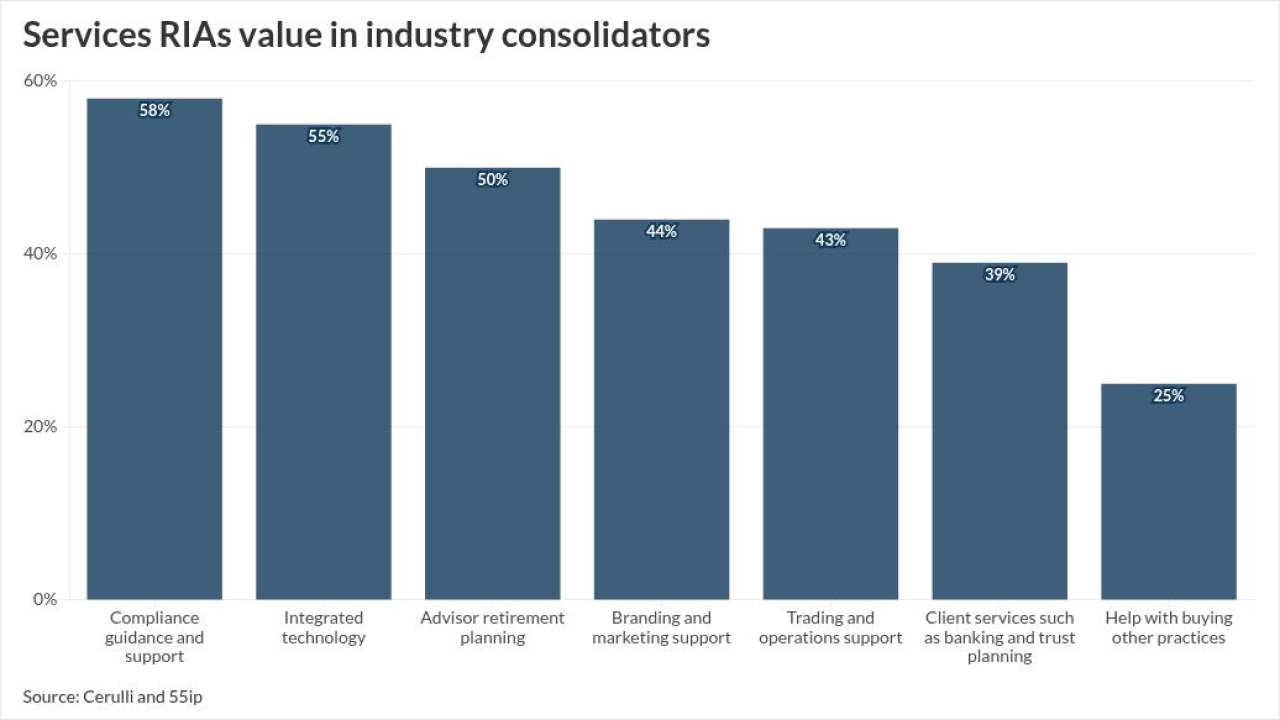It’s the classic “do as I say, not as I do” conundrum.
While many advisors are neglecting their own exit strategies, it’s essential that they prepare clients for their own business off ramp.
More than one in three business owners are planning to sell or pass on their businesses in the next five years, according to a
“The big question we grapple with here is are they ready for an exit?” Michael Crook, head of UBS’ Americas investment strategy, said on a panel at the wealth management firm’s New York City office early this week.
“Generally speaking, the answer is no.”
For one thing, many family business owners assume their children want to step in their shoes. Often this isn’t the case. “The children are not always interested in taking on their businesses,” Crook said.

Advisors need to walk clients through the process and prepare them for emotional difficulties that may lie ahead.
“There comes anger, regret, sorrow, sadness, confusion,” said Sonia Attkiss, a financial advisor at UBS. “All of those things come into that one decision.”
The question that resonates most with Attkiss’ clients: What do you want your legacy to be?
One of the most consequential M&A deals in years leads this roundup of the many ways big independent firms grew in 2025 and how they plan to continue growing in 2026.
Also, Raymond James lands a $420M father-son team from Edward Jones, Cetera recruits a $350M LPL duo, and Cambridge acquires a $1B AUM dual registrant.
“They don’t know how to answer it,” she said.
Advisors can help clients by urging them take a step back from the price tag and get the whole family involved, deciding together what to do with the wealth generated by the liquidity event.
“I've seen a lot of business owners struggle with that,” added Nick Francia, another financial advisor on the panel. “I think it's twofold: You have the legacy of the business and you have the legacy of the individual.”
Sometimes it takes time for a family to adjust to their name coming off the front door of a business, especially if the company was active in the local community, Francia said. He coaches his clients to write a personal mission statement, that they can live up to after the sale.
Crook recommended asking clients pointed questions, including: What do you want to accomplish in your life? Who are the people that matter most to you? What are your main concerns? How do you plan to achieve your life's vision?
Clients also need to be aware of how much they spend, according to advisor Thomas Livaccari.
“It's a very simple question. I asked it this morning, actually: Do you know how much you spend? And you'd be amazed … They never know,” he said.
After the sale, the client’s attitude toward spending will shift, according to Francia.
“They get used to reaching their hand into the cookie jar and being able to pull money out of a company whenever they want to live [their] lifestyle,” he said, adding: “After the liquidity event, it's not about creating wealth anymore; it's about protecting and preserving that wealth, and so it's a much different type of mindset.”
When clients stop seeing the inflows, even if they have a highly liquid portfolio, something changes in their perception, Attkiss said.
“Regardless of the number that they sell their company for, if it's $30 - $50 - $100 million dollars, the moment they sell the business and money stops coming in, they feel poor,” Attkiss said, adding that adjusting may take time.
Livaccari offered another tip: Make sure business owners have a personal attorney during a sale. “[They] need someone to watch out for [their] best interest because sometimes those interests won’t align,” he said.
The extra time on clients’ hands poses another challenge, according to UBS advisor Bryan Stephens, who suggested ways to stay professionally engaged.
“Really have some deep conversations about what [they are] going to do with all [their] time. When you were going a hundred miles an hour working on your business for 25 years, you don't just stop and sit on the beach and play golf,” he said, adding that he sometimes recommends his clients join the board of their old company.
At the end of the day, communication is key, especially among families. To that end, Francia will arrange meetings with the client and their spouse.
“We oftentimes uncover something in these meetings,” Francia said, noting one spouse who hadn’t realized his wife was planning to retire.
Livaccari agreed.
“There's rarely agreement actually. They may agree in front of you, but they'll often come back to you with disagreement offline,” he said.







